Assessment 3: Critical Appraisal of Evidence in Healthcare
VerifiedAdded on 2021/06/17
|8
|1741
|86
Report
AI Summary
This report critically appraises a qualitative research study exploring the relationship between resilience and burnout among human service professionals. The study, authored by Harker, Pidgeon, Klaassen, and King (2016), investigates resilience and mindfulness as preventative factors for psychological distress, burnout, and secondary traumatic stress. The report evaluates the authorship, research question, design, and methods, highlighting the study's use of questionnaires and qualitative data analysis. The results indicate an inverse relationship between resilience and burnout. However, the report identifies limitations, including potential response and sample bias, impacting the applicability of the findings. The conclusion emphasizes the need for further research and workplace interventions to enhance resilience and reduce burnout in health service professionals. The report also includes a discussion of barriers to applying the evidence in practice, such as response bias and sample bias, and concludes that while a relationship exists, more research is needed.
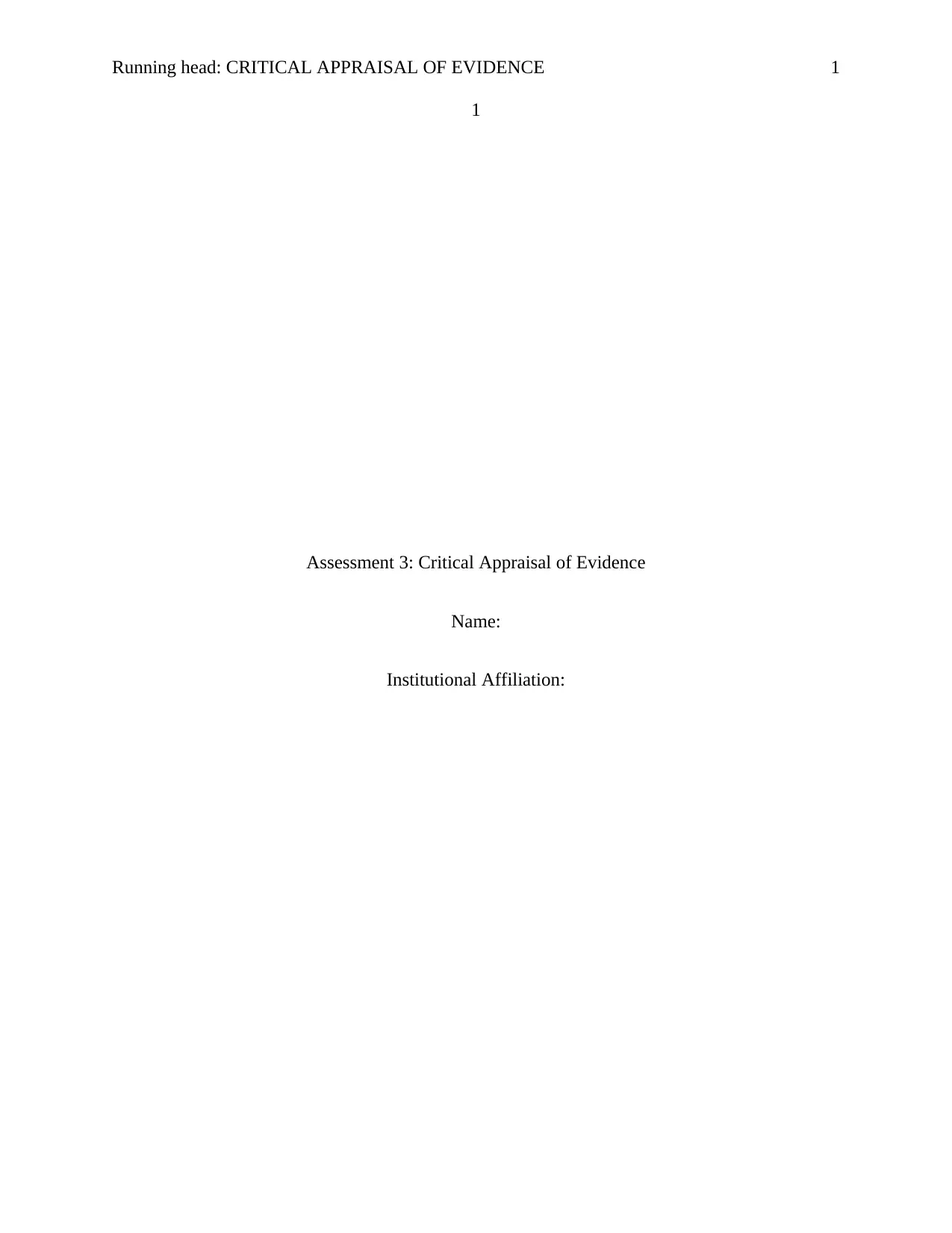
Running head: CRITICAL APPRAISAL OF EVIDENCE 1
1
Assessment 3: Critical Appraisal of Evidence
Name:
Institutional Affiliation:
1
Assessment 3: Critical Appraisal of Evidence
Name:
Institutional Affiliation:
Paraphrase This Document
Need a fresh take? Get an instant paraphrase of this document with our AI Paraphraser
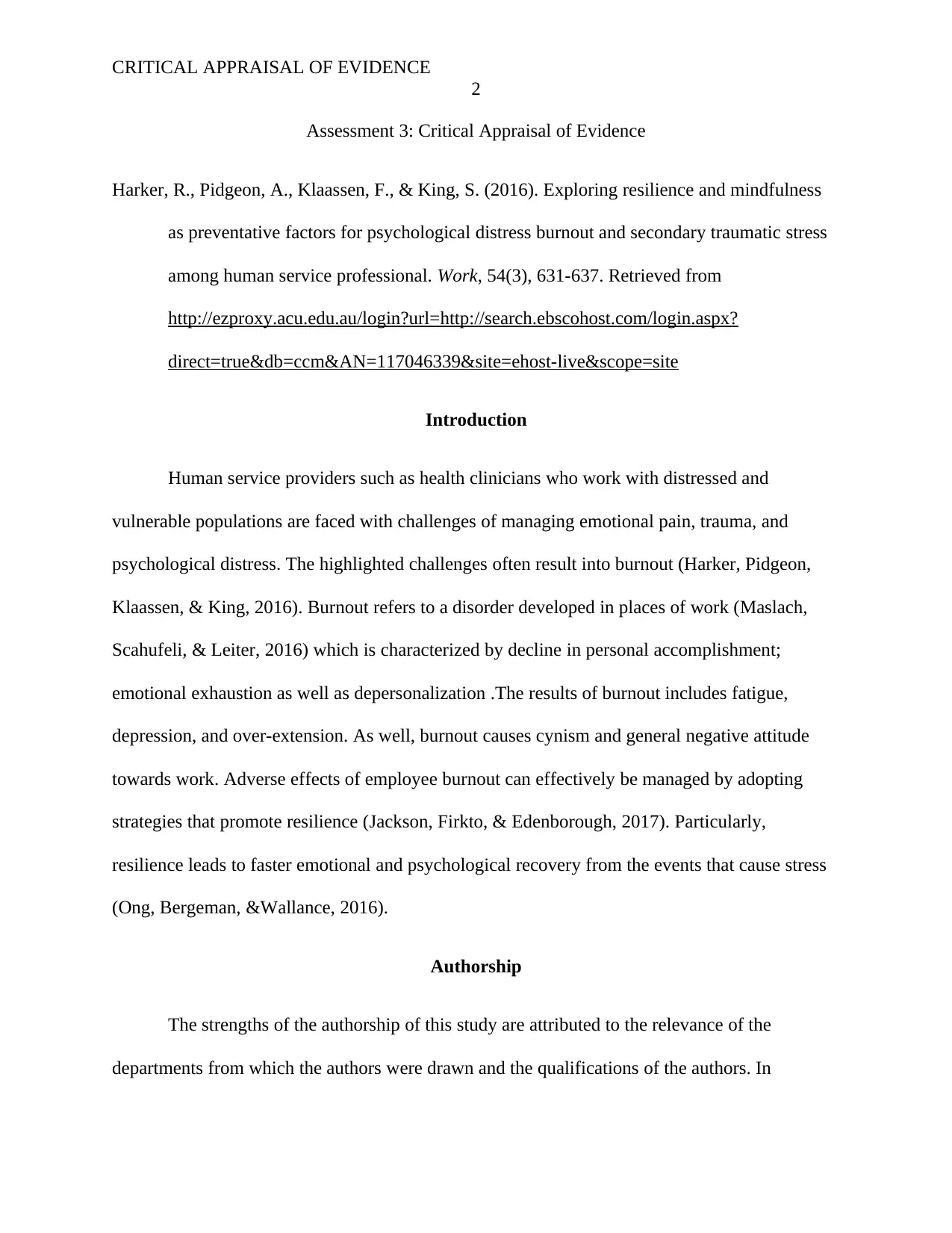
CRITICAL APPRAISAL OF EVIDENCE
2
Assessment 3: Critical Appraisal of Evidence
Harker, R., Pidgeon, A., Klaassen, F., & King, S. (2016). Exploring resilience and mindfulness
as preventative factors for psychological distress burnout and secondary traumatic stress
among human service professional. Work, 54(3), 631-637. Retrieved from
http://ezproxy.acu.edu.au/login?url=http://search.ebscohost.com/login.aspx?
direct=true&db=ccm&AN=117046339&site=ehost-live&scope=site
Introduction
Human service providers such as health clinicians who work with distressed and
vulnerable populations are faced with challenges of managing emotional pain, trauma, and
psychological distress. The highlighted challenges often result into burnout (Harker, Pidgeon,
Klaassen, & King, 2016). Burnout refers to a disorder developed in places of work (Maslach,
Scahufeli, & Leiter, 2016) which is characterized by decline in personal accomplishment;
emotional exhaustion as well as depersonalization .The results of burnout includes fatigue,
depression, and over-extension. As well, burnout causes cynism and general negative attitude
towards work. Adverse effects of employee burnout can effectively be managed by adopting
strategies that promote resilience (Jackson, Firkto, & Edenborough, 2017). Particularly,
resilience leads to faster emotional and psychological recovery from the events that cause stress
(Ong, Bergeman, &Wallance, 2016).
Authorship
The strengths of the authorship of this study are attributed to the relevance of the
departments from which the authors were drawn and the qualifications of the authors. In
2
Assessment 3: Critical Appraisal of Evidence
Harker, R., Pidgeon, A., Klaassen, F., & King, S. (2016). Exploring resilience and mindfulness
as preventative factors for psychological distress burnout and secondary traumatic stress
among human service professional. Work, 54(3), 631-637. Retrieved from
http://ezproxy.acu.edu.au/login?url=http://search.ebscohost.com/login.aspx?
direct=true&db=ccm&AN=117046339&site=ehost-live&scope=site
Introduction
Human service providers such as health clinicians who work with distressed and
vulnerable populations are faced with challenges of managing emotional pain, trauma, and
psychological distress. The highlighted challenges often result into burnout (Harker, Pidgeon,
Klaassen, & King, 2016). Burnout refers to a disorder developed in places of work (Maslach,
Scahufeli, & Leiter, 2016) which is characterized by decline in personal accomplishment;
emotional exhaustion as well as depersonalization .The results of burnout includes fatigue,
depression, and over-extension. As well, burnout causes cynism and general negative attitude
towards work. Adverse effects of employee burnout can effectively be managed by adopting
strategies that promote resilience (Jackson, Firkto, & Edenborough, 2017). Particularly,
resilience leads to faster emotional and psychological recovery from the events that cause stress
(Ong, Bergeman, &Wallance, 2016).
Authorship
The strengths of the authorship of this study are attributed to the relevance of the
departments from which the authors were drawn and the qualifications of the authors. In
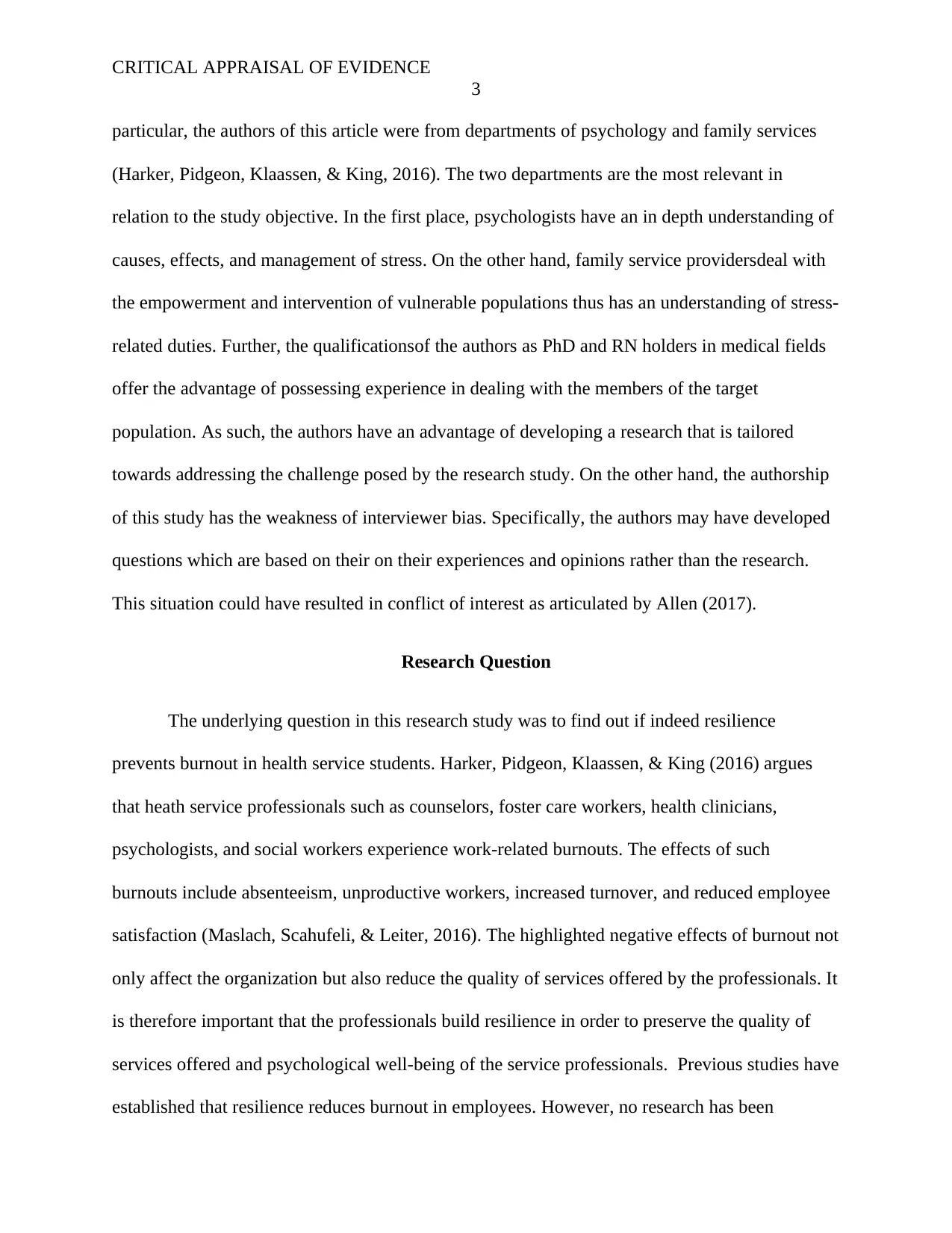
CRITICAL APPRAISAL OF EVIDENCE
3
particular, the authors of this article were from departments of psychology and family services
(Harker, Pidgeon, Klaassen, & King, 2016). The two departments are the most relevant in
relation to the study objective. In the first place, psychologists have an in depth understanding of
causes, effects, and management of stress. On the other hand, family service providersdeal with
the empowerment and intervention of vulnerable populations thus has an understanding of stress-
related duties. Further, the qualificationsof the authors as PhD and RN holders in medical fields
offer the advantage of possessing experience in dealing with the members of the target
population. As such, the authors have an advantage of developing a research that is tailored
towards addressing the challenge posed by the research study. On the other hand, the authorship
of this study has the weakness of interviewer bias. Specifically, the authors may have developed
questions which are based on their on their experiences and opinions rather than the research.
This situation could have resulted in conflict of interest as articulated by Allen (2017).
Research Question
The underlying question in this research study was to find out if indeed resilience
prevents burnout in health service students. Harker, Pidgeon, Klaassen, & King (2016) argues
that heath service professionals such as counselors, foster care workers, health clinicians,
psychologists, and social workers experience work-related burnouts. The effects of such
burnouts include absenteeism, unproductive workers, increased turnover, and reduced employee
satisfaction (Maslach, Scahufeli, & Leiter, 2016). The highlighted negative effects of burnout not
only affect the organization but also reduce the quality of services offered by the professionals. It
is therefore important that the professionals build resilience in order to preserve the quality of
services offered and psychological well-being of the service professionals. Previous studies have
established that resilience reduces burnout in employees. However, no research has been
3
particular, the authors of this article were from departments of psychology and family services
(Harker, Pidgeon, Klaassen, & King, 2016). The two departments are the most relevant in
relation to the study objective. In the first place, psychologists have an in depth understanding of
causes, effects, and management of stress. On the other hand, family service providersdeal with
the empowerment and intervention of vulnerable populations thus has an understanding of stress-
related duties. Further, the qualificationsof the authors as PhD and RN holders in medical fields
offer the advantage of possessing experience in dealing with the members of the target
population. As such, the authors have an advantage of developing a research that is tailored
towards addressing the challenge posed by the research study. On the other hand, the authorship
of this study has the weakness of interviewer bias. Specifically, the authors may have developed
questions which are based on their on their experiences and opinions rather than the research.
This situation could have resulted in conflict of interest as articulated by Allen (2017).
Research Question
The underlying question in this research study was to find out if indeed resilience
prevents burnout in health service students. Harker, Pidgeon, Klaassen, & King (2016) argues
that heath service professionals such as counselors, foster care workers, health clinicians,
psychologists, and social workers experience work-related burnouts. The effects of such
burnouts include absenteeism, unproductive workers, increased turnover, and reduced employee
satisfaction (Maslach, Scahufeli, & Leiter, 2016). The highlighted negative effects of burnout not
only affect the organization but also reduce the quality of services offered by the professionals. It
is therefore important that the professionals build resilience in order to preserve the quality of
services offered and psychological well-being of the service professionals. Previous studies have
established that resilience reduces burnout in employees. However, no research has been
⊘ This is a preview!⊘
Do you want full access?
Subscribe today to unlock all pages.

Trusted by 1+ million students worldwide
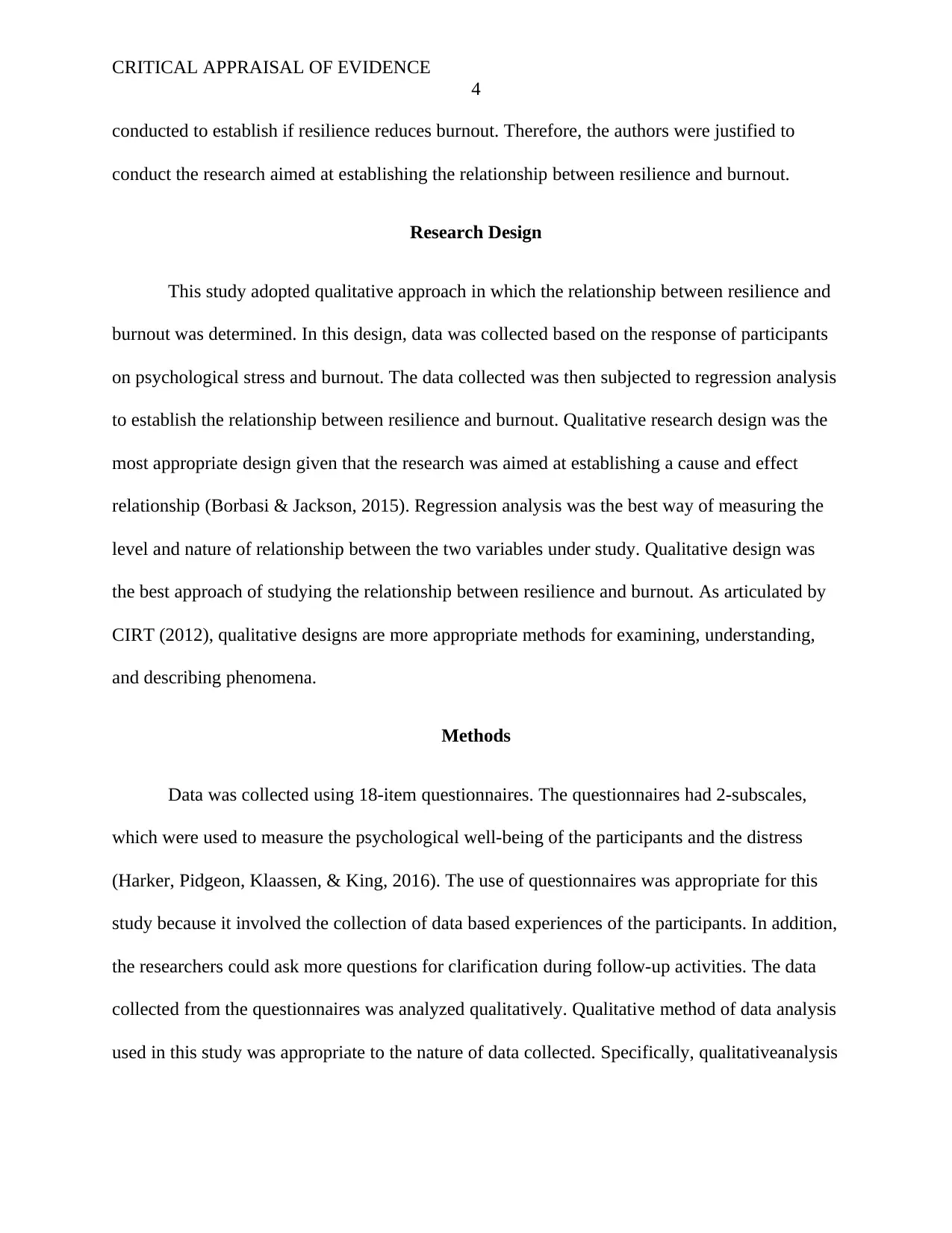
CRITICAL APPRAISAL OF EVIDENCE
4
conducted to establish if resilience reduces burnout. Therefore, the authors were justified to
conduct the research aimed at establishing the relationship between resilience and burnout.
Research Design
This study adopted qualitative approach in which the relationship between resilience and
burnout was determined. In this design, data was collected based on the response of participants
on psychological stress and burnout. The data collected was then subjected to regression analysis
to establish the relationship between resilience and burnout. Qualitative research design was the
most appropriate design given that the research was aimed at establishing a cause and effect
relationship (Borbasi & Jackson, 2015). Regression analysis was the best way of measuring the
level and nature of relationship between the two variables under study. Qualitative design was
the best approach of studying the relationship between resilience and burnout. As articulated by
CIRT (2012), qualitative designs are more appropriate methods for examining, understanding,
and describing phenomena.
Methods
Data was collected using 18-item questionnaires. The questionnaires had 2-subscales,
which were used to measure the psychological well-being of the participants and the distress
(Harker, Pidgeon, Klaassen, & King, 2016). The use of questionnaires was appropriate for this
study because it involved the collection of data based experiences of the participants. In addition,
the researchers could ask more questions for clarification during follow-up activities. The data
collected from the questionnaires was analyzed qualitatively. Qualitative method of data analysis
used in this study was appropriate to the nature of data collected. Specifically, qualitativeanalysis
4
conducted to establish if resilience reduces burnout. Therefore, the authors were justified to
conduct the research aimed at establishing the relationship between resilience and burnout.
Research Design
This study adopted qualitative approach in which the relationship between resilience and
burnout was determined. In this design, data was collected based on the response of participants
on psychological stress and burnout. The data collected was then subjected to regression analysis
to establish the relationship between resilience and burnout. Qualitative research design was the
most appropriate design given that the research was aimed at establishing a cause and effect
relationship (Borbasi & Jackson, 2015). Regression analysis was the best way of measuring the
level and nature of relationship between the two variables under study. Qualitative design was
the best approach of studying the relationship between resilience and burnout. As articulated by
CIRT (2012), qualitative designs are more appropriate methods for examining, understanding,
and describing phenomena.
Methods
Data was collected using 18-item questionnaires. The questionnaires had 2-subscales,
which were used to measure the psychological well-being of the participants and the distress
(Harker, Pidgeon, Klaassen, & King, 2016). The use of questionnaires was appropriate for this
study because it involved the collection of data based experiences of the participants. In addition,
the researchers could ask more questions for clarification during follow-up activities. The data
collected from the questionnaires was analyzed qualitatively. Qualitative method of data analysis
used in this study was appropriate to the nature of data collected. Specifically, qualitativeanalysis
Paraphrase This Document
Need a fresh take? Get an instant paraphrase of this document with our AI Paraphraser
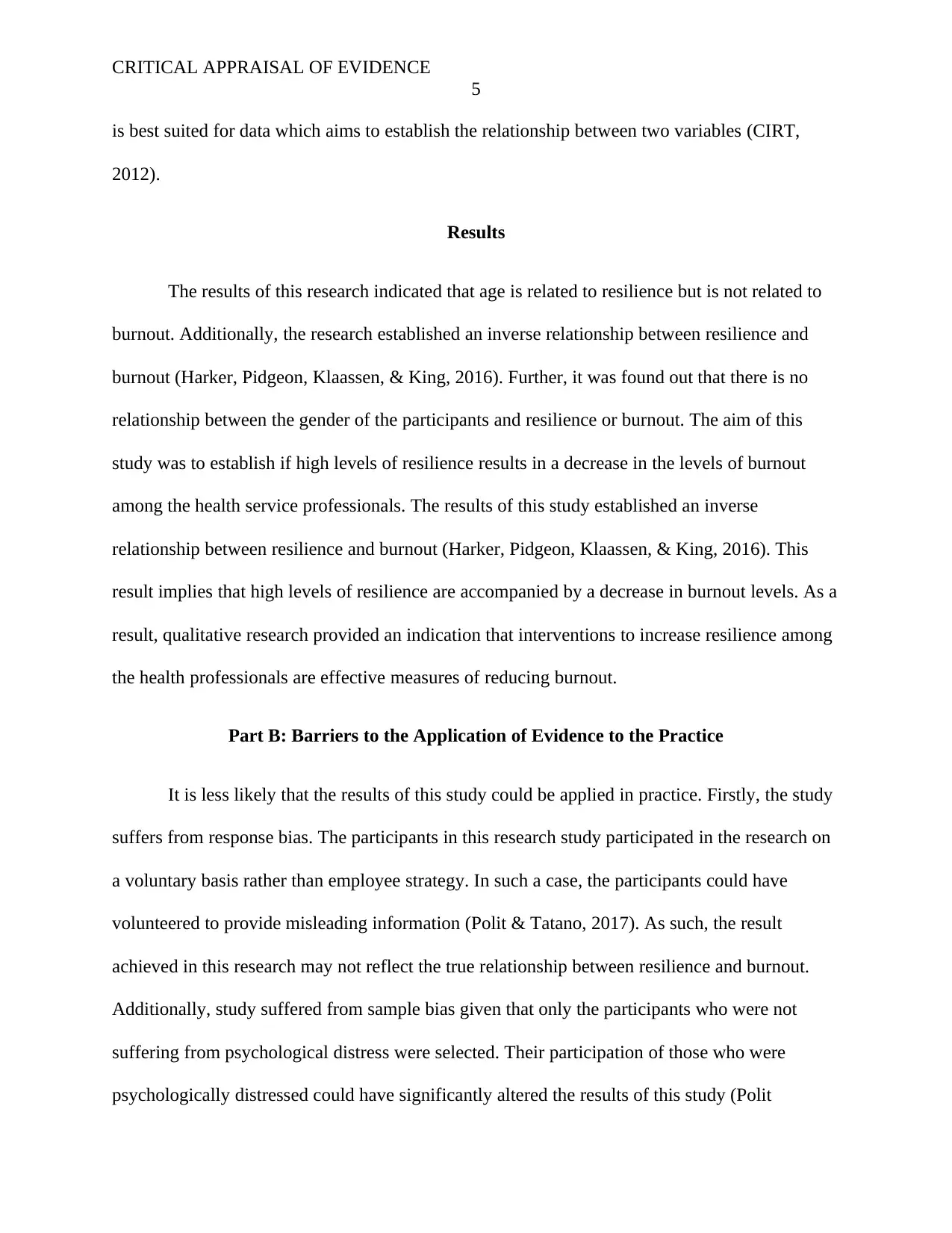
CRITICAL APPRAISAL OF EVIDENCE
5
is best suited for data which aims to establish the relationship between two variables (CIRT,
2012).
Results
The results of this research indicated that age is related to resilience but is not related to
burnout. Additionally, the research established an inverse relationship between resilience and
burnout (Harker, Pidgeon, Klaassen, & King, 2016). Further, it was found out that there is no
relationship between the gender of the participants and resilience or burnout. The aim of this
study was to establish if high levels of resilience results in a decrease in the levels of burnout
among the health service professionals. The results of this study established an inverse
relationship between resilience and burnout (Harker, Pidgeon, Klaassen, & King, 2016). This
result implies that high levels of resilience are accompanied by a decrease in burnout levels. As a
result, qualitative research provided an indication that interventions to increase resilience among
the health professionals are effective measures of reducing burnout.
Part B: Barriers to the Application of Evidence to the Practice
It is less likely that the results of this study could be applied in practice. Firstly, the study
suffers from response bias. The participants in this research study participated in the research on
a voluntary basis rather than employee strategy. In such a case, the participants could have
volunteered to provide misleading information (Polit & Tatano, 2017). As such, the result
achieved in this research may not reflect the true relationship between resilience and burnout.
Additionally, study suffered from sample bias given that only the participants who were not
suffering from psychological distress were selected. Their participation of those who were
psychologically distressed could have significantly altered the results of this study (Polit
5
is best suited for data which aims to establish the relationship between two variables (CIRT,
2012).
Results
The results of this research indicated that age is related to resilience but is not related to
burnout. Additionally, the research established an inverse relationship between resilience and
burnout (Harker, Pidgeon, Klaassen, & King, 2016). Further, it was found out that there is no
relationship between the gender of the participants and resilience or burnout. The aim of this
study was to establish if high levels of resilience results in a decrease in the levels of burnout
among the health service professionals. The results of this study established an inverse
relationship between resilience and burnout (Harker, Pidgeon, Klaassen, & King, 2016). This
result implies that high levels of resilience are accompanied by a decrease in burnout levels. As a
result, qualitative research provided an indication that interventions to increase resilience among
the health professionals are effective measures of reducing burnout.
Part B: Barriers to the Application of Evidence to the Practice
It is less likely that the results of this study could be applied in practice. Firstly, the study
suffers from response bias. The participants in this research study participated in the research on
a voluntary basis rather than employee strategy. In such a case, the participants could have
volunteered to provide misleading information (Polit & Tatano, 2017). As such, the result
achieved in this research may not reflect the true relationship between resilience and burnout.
Additionally, study suffered from sample bias given that only the participants who were not
suffering from psychological distress were selected. Their participation of those who were
psychologically distressed could have significantly altered the results of this study (Polit
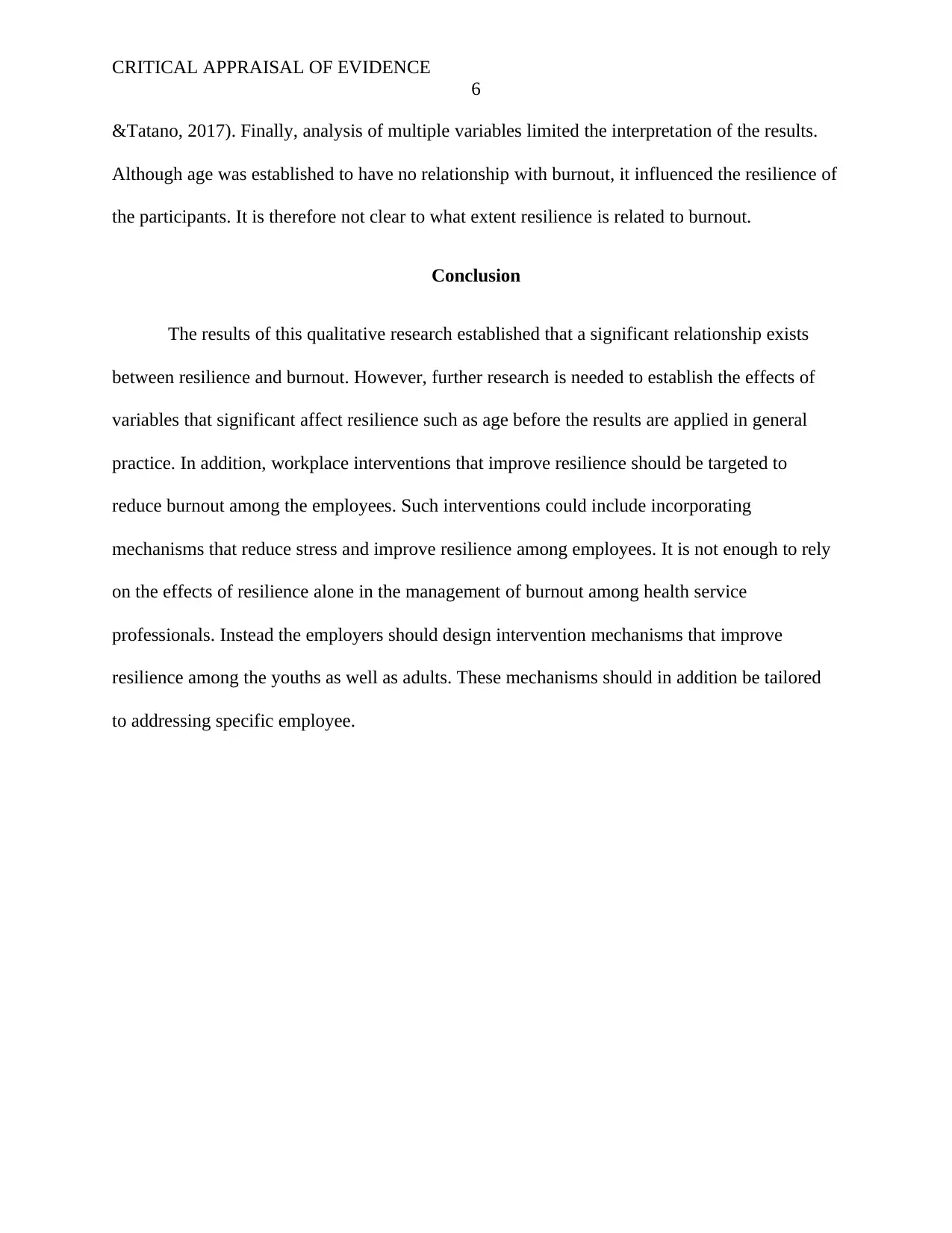
CRITICAL APPRAISAL OF EVIDENCE
6
&Tatano, 2017). Finally, analysis of multiple variables limited the interpretation of the results.
Although age was established to have no relationship with burnout, it influenced the resilience of
the participants. It is therefore not clear to what extent resilience is related to burnout.
Conclusion
The results of this qualitative research established that a significant relationship exists
between resilience and burnout. However, further research is needed to establish the effects of
variables that significant affect resilience such as age before the results are applied in general
practice. In addition, workplace interventions that improve resilience should be targeted to
reduce burnout among the employees. Such interventions could include incorporating
mechanisms that reduce stress and improve resilience among employees. It is not enough to rely
on the effects of resilience alone in the management of burnout among health service
professionals. Instead the employers should design intervention mechanisms that improve
resilience among the youths as well as adults. These mechanisms should in addition be tailored
to addressing specific employee.
6
&Tatano, 2017). Finally, analysis of multiple variables limited the interpretation of the results.
Although age was established to have no relationship with burnout, it influenced the resilience of
the participants. It is therefore not clear to what extent resilience is related to burnout.
Conclusion
The results of this qualitative research established that a significant relationship exists
between resilience and burnout. However, further research is needed to establish the effects of
variables that significant affect resilience such as age before the results are applied in general
practice. In addition, workplace interventions that improve resilience should be targeted to
reduce burnout among the employees. Such interventions could include incorporating
mechanisms that reduce stress and improve resilience among employees. It is not enough to rely
on the effects of resilience alone in the management of burnout among health service
professionals. Instead the employers should design intervention mechanisms that improve
resilience among the youths as well as adults. These mechanisms should in addition be tailored
to addressing specific employee.
⊘ This is a preview!⊘
Do you want full access?
Subscribe today to unlock all pages.

Trusted by 1+ million students worldwide
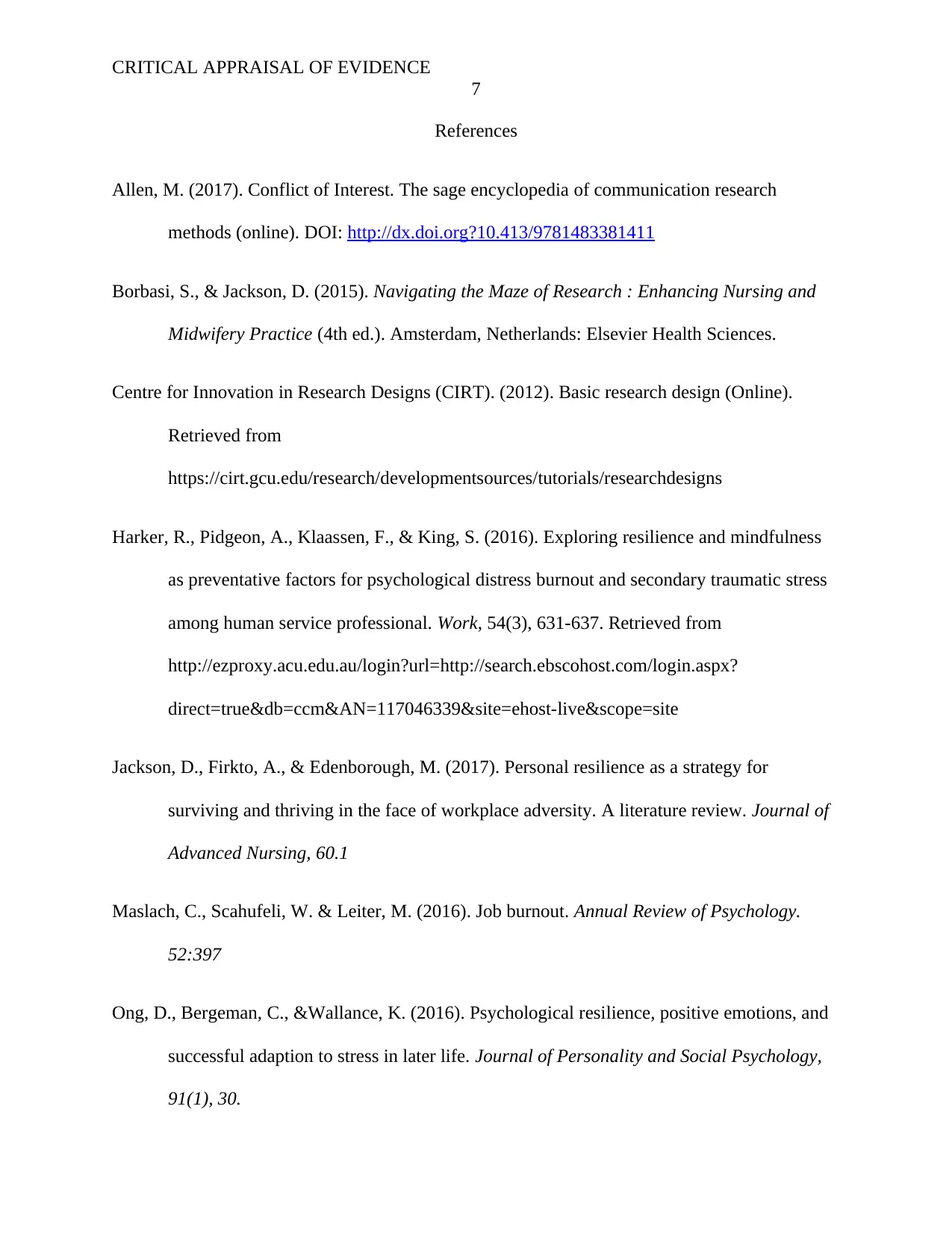
CRITICAL APPRAISAL OF EVIDENCE
7
References
Allen, M. (2017). Conflict of Interest. The sage encyclopedia of communication research
methods (online). DOI: http://dx.doi.org?10.413/9781483381411
Borbasi, S., & Jackson, D. (2015). Navigating the Maze of Research : Enhancing Nursing and
Midwifery Practice (4th ed.). Amsterdam, Netherlands: Elsevier Health Sciences.
Centre for Innovation in Research Designs (CIRT). (2012). Basic research design (Online).
Retrieved from
https://cirt.gcu.edu/research/developmentsources/tutorials/researchdesigns
Harker, R., Pidgeon, A., Klaassen, F., & King, S. (2016). Exploring resilience and mindfulness
as preventative factors for psychological distress burnout and secondary traumatic stress
among human service professional. Work, 54(3), 631-637. Retrieved from
http://ezproxy.acu.edu.au/login?url=http://search.ebscohost.com/login.aspx?
direct=true&db=ccm&AN=117046339&site=ehost-live&scope=site
Jackson, D., Firkto, A., & Edenborough, M. (2017). Personal resilience as a strategy for
surviving and thriving in the face of workplace adversity. A literature review. Journal of
Advanced Nursing, 60.1
Maslach, C., Scahufeli, W. & Leiter, M. (2016). Job burnout. Annual Review of Psychology.
52:397
Ong, D., Bergeman, C., &Wallance, K. (2016). Psychological resilience, positive emotions, and
successful adaption to stress in later life. Journal of Personality and Social Psychology,
91(1), 30.
7
References
Allen, M. (2017). Conflict of Interest. The sage encyclopedia of communication research
methods (online). DOI: http://dx.doi.org?10.413/9781483381411
Borbasi, S., & Jackson, D. (2015). Navigating the Maze of Research : Enhancing Nursing and
Midwifery Practice (4th ed.). Amsterdam, Netherlands: Elsevier Health Sciences.
Centre for Innovation in Research Designs (CIRT). (2012). Basic research design (Online).
Retrieved from
https://cirt.gcu.edu/research/developmentsources/tutorials/researchdesigns
Harker, R., Pidgeon, A., Klaassen, F., & King, S. (2016). Exploring resilience and mindfulness
as preventative factors for psychological distress burnout and secondary traumatic stress
among human service professional. Work, 54(3), 631-637. Retrieved from
http://ezproxy.acu.edu.au/login?url=http://search.ebscohost.com/login.aspx?
direct=true&db=ccm&AN=117046339&site=ehost-live&scope=site
Jackson, D., Firkto, A., & Edenborough, M. (2017). Personal resilience as a strategy for
surviving and thriving in the face of workplace adversity. A literature review. Journal of
Advanced Nursing, 60.1
Maslach, C., Scahufeli, W. & Leiter, M. (2016). Job burnout. Annual Review of Psychology.
52:397
Ong, D., Bergeman, C., &Wallance, K. (2016). Psychological resilience, positive emotions, and
successful adaption to stress in later life. Journal of Personality and Social Psychology,
91(1), 30.
Paraphrase This Document
Need a fresh take? Get an instant paraphrase of this document with our AI Paraphraser
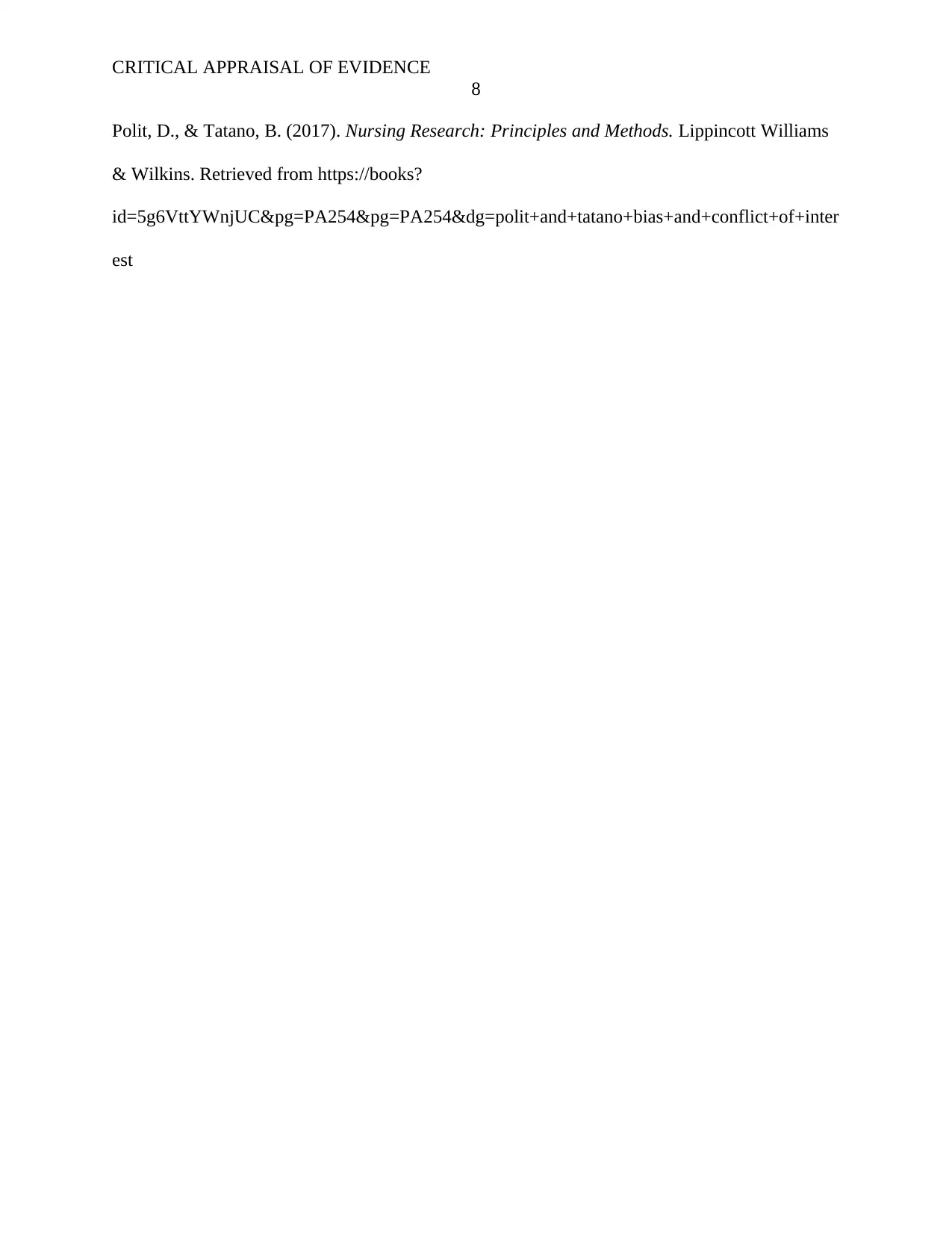
CRITICAL APPRAISAL OF EVIDENCE
8
Polit, D., & Tatano, B. (2017). Nursing Research: Principles and Methods. Lippincott Williams
& Wilkins. Retrieved from https://books?
id=5g6VttYWnjUC&pg=PA254&pg=PA254&dg=polit+and+tatano+bias+and+conflict+of+inter
est
8
Polit, D., & Tatano, B. (2017). Nursing Research: Principles and Methods. Lippincott Williams
& Wilkins. Retrieved from https://books?
id=5g6VttYWnjUC&pg=PA254&pg=PA254&dg=polit+and+tatano+bias+and+conflict+of+inter
est
1 out of 8
Related Documents
Your All-in-One AI-Powered Toolkit for Academic Success.
+13062052269
info@desklib.com
Available 24*7 on WhatsApp / Email
![[object Object]](/_next/static/media/star-bottom.7253800d.svg)
Unlock your academic potential
Copyright © 2020–2026 A2Z Services. All Rights Reserved. Developed and managed by ZUCOL.





